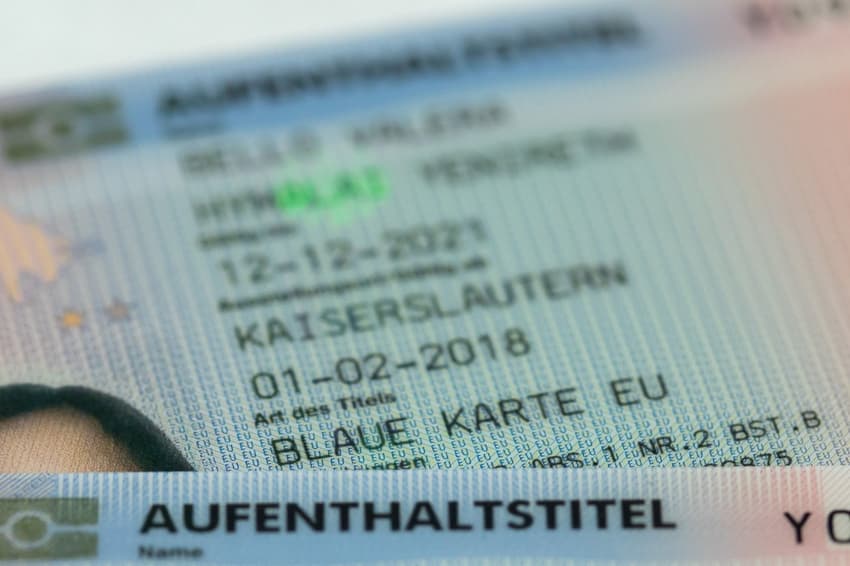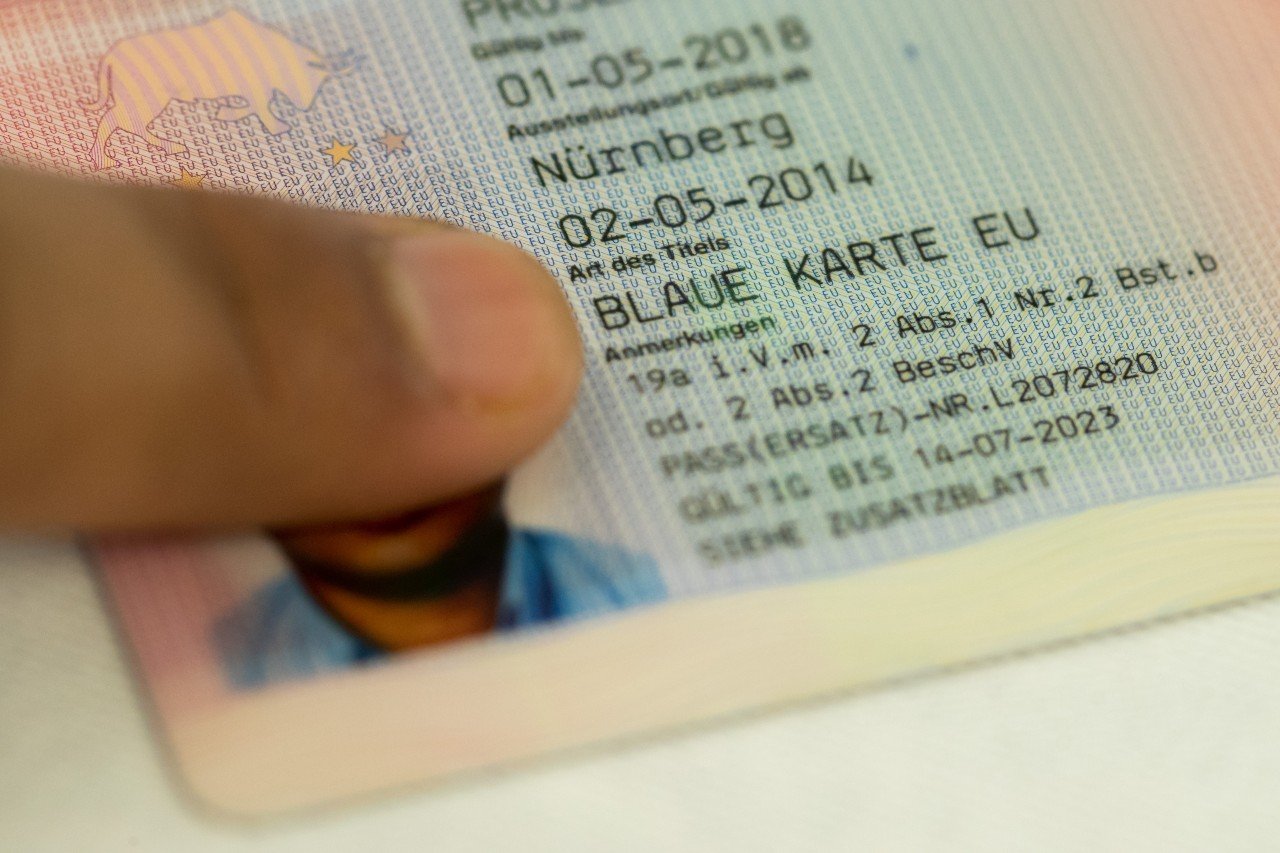How Germany is making it easier for skilled workers to get an EU Blue Card

As of November, Germany has eased the rules for skilled workers to acquire the Blue Card visa.
One of the most popular routes for moving to Germany as a skilled worker is via the EU Blue Card scheme, which offers work permits for people in skilled professions that traditionally command higher salaries. Those who hold the card are also offered a faster path to permanent residency, qualifying as early as 21 months after moving to the Bundesrepublik.
Germany issues more of the coveted cards than other country in the EU. But third-country workers have had to jump through many loopholes to get their hands on them, including finding a job which meets a high salary threshold.
In November Germany introduced an upgraded EU Blue Card, which will make this sought-after document much easier to obtain. It also gives Blue Card holders greater mobility rights and easier family reunification.
Here are the four main ways applying for a Blue Card has changed.
Lower salary threshold
At present, most workers hoping to get their hands on a Blue Card need to be taking home at least €58,400 per year before taxes - in other words, well above Germany's average income - though workers in high-demand fields like IT, mathematics, natural sciences, engineering and medicine, are permitted to have a lower salary of €45,552.
But as of November this has been lowered drastically. The salary requirements will be linked to the so-called pension contribution assessment ceiling, or simply put, the upper salary threshold for paying statutory pension contributions. In future, the salary thresholds for Blue Cards will be set at 45.3 percent of the pension contribution ceiling for in-demand workers in "bottleneck" professions and at 50 percent for everyone else.
 An EU Blue Card issued in Nuremberg, Germany. Photo: picture alliance/dpa | Daniel Karmann
An EU Blue Card issued in Nuremberg, Germany. Photo: picture alliance/dpa | Daniel Karmann
That means that in 2023, people in sought-after professions like mathematics, healthcare and IT will get by with a salary of €39,682.80, while all other workers have to earn more than €43,800 to be eligible.
More people will be eligible
Currently, people in the bottleneck professions - i.e. those with the most severe labour shortages - are given special conditions when applying for an EU Blue Card. However, the definition of a bottleneck profession remains quite narrow, with just IT, human medicine, mathematics, engineering and science making the cut.
This will soon be broadened out significantly to include nurses, teaches, pharmacists, vets, dentists, professional service managers and people in manufacturing, mining or construction. That means that these groups will also be eligible for a Blue Card at the lower €39,682 salary. You can find a full, updated list of the bottleneck professions here.
In addition, career entrants who've graduated from university within the past three years will also be eligible for a Blue Card on a lower salary, as will IT workers who can prove they have at least three years of experience - even if they don't have a degree.
READ ALSO: COMPARED: What salary do you need to get a work permit in different European countries?
Freedom of movement rights
People who hold a Blue Card from another EU country will be able to come to Germany for up to 90 days on work-related trips without needing a visa. In addition, people who've been living in another EU country on a Blue Card for at least a year will be able to live and work in Germany long-term without needing a visa.
Instead, they will simply have to apply for a German EU Blue Card at their local foreigner's authority (Ausländerbehörde).
Streamlined family reunification
If family members have already gone through the process of applying for a reunification visa once, they will no longer have to repeat this arduous process again in Germany.
That's because the families of EU Blue Card holders who lived with them in another member state can use this previous permit to live and work in Germany without applying for a new visa. In addition, they'll no longer have to prove sufficient living space or the means to support themselves.
How do I apply for a Blue Card?
Either you or your employer can fill out the application for the Blue Card, and the documents can be submitted to the foreigner’s office in Germany or your embassy abroad if you come from a country which requires a visa to enter the country.
Nationals of Australia, Canada, Israel, Japan, South Korea, New Zealand, US and the UK are allowed to enter Germany on a three-month tourism visa and then apply. The foreigner’s office states that nations of all other countries - if not already living in Germany on a residence permit - should apply at their home country’s consulate.
In Germany, the time to process an application often only takes days or weeks rather than months as is the case for other types of work permits, according to the EU Blue Card Network.
Not just valid for working in Germany
After 18 months, or 1.5 years, of working in Germany, Blue Card holders can move to any other EU country. The only EU countries where this doesn’t apply are Denmark, Ireland and the UK - which has been the case since the beginning of the Blue Card system.
Blue Card holders can also leave the EU for up to 12 months without losing the right of working there.
It is also a swift process to acquire a Blue Card for another European country when you already have a Blue Card for one country - for example, an Austrian Blue Card if you are employed in Germany on one.
Comments (1)
See Also
One of the most popular routes for moving to Germany as a skilled worker is via the EU Blue Card scheme, which offers work permits for people in skilled professions that traditionally command higher salaries. Those who hold the card are also offered a faster path to permanent residency, qualifying as early as 21 months after moving to the Bundesrepublik.
Germany issues more of the coveted cards than other country in the EU. But third-country workers have had to jump through many loopholes to get their hands on them, including finding a job which meets a high salary threshold.
In November Germany introduced an upgraded EU Blue Card, which will make this sought-after document much easier to obtain. It also gives Blue Card holders greater mobility rights and easier family reunification.
Here are the four main ways applying for a Blue Card has changed.
Lower salary threshold
At present, most workers hoping to get their hands on a Blue Card need to be taking home at least €58,400 per year before taxes - in other words, well above Germany's average income - though workers in high-demand fields like IT, mathematics, natural sciences, engineering and medicine, are permitted to have a lower salary of €45,552.
But as of November this has been lowered drastically. The salary requirements will be linked to the so-called pension contribution assessment ceiling, or simply put, the upper salary threshold for paying statutory pension contributions. In future, the salary thresholds for Blue Cards will be set at 45.3 percent of the pension contribution ceiling for in-demand workers in "bottleneck" professions and at 50 percent for everyone else.

That means that in 2023, people in sought-after professions like mathematics, healthcare and IT will get by with a salary of €39,682.80, while all other workers have to earn more than €43,800 to be eligible.
More people will be eligible
Currently, people in the bottleneck professions - i.e. those with the most severe labour shortages - are given special conditions when applying for an EU Blue Card. However, the definition of a bottleneck profession remains quite narrow, with just IT, human medicine, mathematics, engineering and science making the cut.
This will soon be broadened out significantly to include nurses, teaches, pharmacists, vets, dentists, professional service managers and people in manufacturing, mining or construction. That means that these groups will also be eligible for a Blue Card at the lower €39,682 salary. You can find a full, updated list of the bottleneck professions here.
In addition, career entrants who've graduated from university within the past three years will also be eligible for a Blue Card on a lower salary, as will IT workers who can prove they have at least three years of experience - even if they don't have a degree.
READ ALSO: COMPARED: What salary do you need to get a work permit in different European countries?
Freedom of movement rights
People who hold a Blue Card from another EU country will be able to come to Germany for up to 90 days on work-related trips without needing a visa. In addition, people who've been living in another EU country on a Blue Card for at least a year will be able to live and work in Germany long-term without needing a visa.
Instead, they will simply have to apply for a German EU Blue Card at their local foreigner's authority (Ausländerbehörde).
Streamlined family reunification
If family members have already gone through the process of applying for a reunification visa once, they will no longer have to repeat this arduous process again in Germany.
That's because the families of EU Blue Card holders who lived with them in another member state can use this previous permit to live and work in Germany without applying for a new visa. In addition, they'll no longer have to prove sufficient living space or the means to support themselves.
How do I apply for a Blue Card?
Either you or your employer can fill out the application for the Blue Card, and the documents can be submitted to the foreigner’s office in Germany or your embassy abroad if you come from a country which requires a visa to enter the country.
Nationals of Australia, Canada, Israel, Japan, South Korea, New Zealand, US and the UK are allowed to enter Germany on a three-month tourism visa and then apply. The foreigner’s office states that nations of all other countries - if not already living in Germany on a residence permit - should apply at their home country’s consulate.
In Germany, the time to process an application often only takes days or weeks rather than months as is the case for other types of work permits, according to the EU Blue Card Network.
Not just valid for working in Germany
After 18 months, or 1.5 years, of working in Germany, Blue Card holders can move to any other EU country. The only EU countries where this doesn’t apply are Denmark, Ireland and the UK - which has been the case since the beginning of the Blue Card system.
Blue Card holders can also leave the EU for up to 12 months without losing the right of working there.
It is also a swift process to acquire a Blue Card for another European country when you already have a Blue Card for one country - for example, an Austrian Blue Card if you are employed in Germany on one.
Join the conversation in our comments section below. Share your own views and experience and if you have a question or suggestion for our journalists then email us at [email protected].
Please keep comments civil, constructive and on topic – and make sure to read our terms of use before getting involved.
Please log in here to leave a comment.